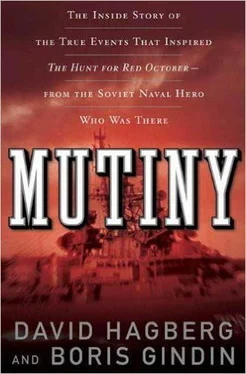Lisenko comes to Boris to report that the tanks and piping have been painted. He wants the lieutenant’s signature on the compliance certificate.
It’s what Boris has been waiting for, because he watched the entire process. Lisenko hired women to climb through the access hatches and do the painting. But the women Boris saw doing the work were big, heavy boned, even fat. There is no way that they could have done a good job. They don’t have the agility.
“I’m sorry, but I can’t sign the certificate,” Boris says.
Lisenko’s face falls. He wants to argue, but Boris is firm.
“There is one condition, however,” Boris tells the supervisor.
“What is it, Lieutenant?”
“I need paint.”
Lisenko is to deliver to the ship three barrels of fresh paint and a very large bag of new, clean brushes. Boris will have his own sailors finish the job.
Within the hour the paint and brushes are delivered and Boris signs the certificate. How Lisenko will explain the missing supplies is his own business, but Boris is certain that his engines will get clean fuel.
About two weeks later Lisenko is back for another signature. His crew has finished painting the bulkheads and decks in the machinery spaces. Boris is doing some paperwork in his cabin when Lisenko shows up. The man is in his forties, short, stocky, always moving fast, his eyes shifting. He tries to smile, but it never looks sincere. His blue coveralls don’t fit, his hair is always a mess, and he’s usually spattered with paint.
“How are you, Boris?” he says. He has a small, round face and beady eyes. He’s clutching some papers in his hand. “We’re finished painting your spaces. Is everything okay? I’d like you to sign—”
Boris cuts him off. “You must be kidding? Do you see my cabin?”
“I’m not sure I understand you,” Lisenko says. He’s looking around Boris’s cabin, trying to figure out what he’s missing. But so far as he can see, the paintwork looks pretty good.
“Well, let me explain something to you, Nikolai. I’ll be going out to sea on a six-month rotation. But you already know this.”
Lisenko nods. “Da, I’m aware.”
“I don’t know how it’ll be possible for me to relax in here on my off-duty hours. I have no place to put my shoes, for instance. Not even a drawer. And my bed is damned uncomfortable. It would be so much better if I had a nice sofa with a good mattress. It would make my life defending the Rodina so much easier to bear.”
Lisenko’s smile is suddenly genuine. “I don’t think that will be a problem, Boris,” he says. “Could you please leave your cabin and come back in… let’s say two hours?”
Boris grabs the papers that he’s been working on and heads up to the officers’ dining hall. When he returns to his cabin two hours later, a drawer has been installed for his shoes and sitting against the wall is a very comfortable-looking sofa.
Lisenko hands the compliance papers to Boris, who signs them, and leaves. It’s another of the systems in the Soviet navy that work.
A few days later Potulniy happens to walk past Boris’s cabin and knocks on the door. Potulniy wants to discuss the progress that has been made aligning the main gas turbine engines. He notices the changes immediately.
“Very nice, Boris,” he says.
“Thank you, sir,” Boris replies, wondering what’ll happen next. What he has done is not strictly by the book, and the captain has a reputation for following Soviet naval regulations pretty closely.
“You seem very cozy in here. Not bad for a senior lieutenant. I guess if I were to ask you how you got this sofa in your cabin it would sound silly, so I won’t ask.”
“Yes, sir,” Boris says. He’s not even going to try to explain.
“It looks like only you and I among all the officers got sofas.” Potulniy smiles.
He knows that Boris has been putting in some very long hours getting the work done belowdecks, and he’s guessed that Boris has made some good connections with the contractors, which means the jobs that Boris oversaw have been done right. Potulniy decides to cut his senior lieutenant some slack.
The captain smiles again. “Good work.”
It’s five months now that Boris has been aboard ship. He is an engineer by education at the academy, but perhaps even more important, he is an engineer by birth. He loved and respected his father, who was an engineer. Some things run deep in a man’s blood. Especially a Russian man’s. Which translates to mean that Senior Lieutenant Gindin knows the machinery and machinery spaces aboard this ship better than anyone else aboard, except perhaps for Potulniy, the precise captain. In fact, that’s one of the reasons both men have a building respect for each other.
Make no mistake, this is the captain’s ship, no matter how Gindin already feels about him. So when it it’s time to send the Storozhevoy down the ways, launch him into the water, it is Potulniy’s wife, Nadezhda, who is given the honor of breaking the bottle of champagne against the bow.
The entire crew is gathered on the dock, along with the shipyard workers and managers, plus a lot of navy dignitaries. It’s a crisp late-fall day, with a sharp blue sky and fast-moving white clouds. A fairly good breeze is kicking up small whitecaps in the harbor, and everyone is in high spirits. The Storozhevoy not only looks like a deadly Soviet warship of the line, but also is beautiful, with graceful lines and a design that U.S. Navy analysts would later call “neat, workmanlike, and elegant.” He bristles with weapons systems, rocket launchers, torpedo tubes, deadly-looking guns, rotating radar antennas, and dozens of systems that many of the visitors can only guess and marvel at.
“It was the true moment of the Storozhevoy’s birth,” Gindin recalls. “We felt like parents about to see their first kid taking its first steps. I was new, but still I sensed that I was a part of what would be a significant event in my life. I was very proud of my ship and my crew, that we were going to be serving in this state-of-the-art vessel.”
The port side of the ship rises sharply above the crowds. Nadezhda climbs four steps up to a wooden platform that puts her within swinging distance of the sharply flaring bow, her husband at her elbow to make sure she doesn’t trip and fall, and some admiral and his aide next to them.
Potulniy hands his wife the bottle of champagne that is suspended by a thin rope from a truss above the platform. She is to swing the bottle in an arc so that it will break against the hull. “God bless this ship and all who sail on him,” someone in the crowd is bound to mutter as the bottle breaks.
Nadezhda raises the bottle over her head and swings it as hard as she can toward the Storozhevoy’s bow. The bottle makes its short arc, slams against the thick steel plating of the bow, and bounces off.
All those gathered for the ceremony on the dock heave a collective sigh. Such missteps are not unknown at ship launchings, but Gindin feels goose bumps on his skin.
“I can’t explain,” he remembers. “But something inside of me tightened up. My gut clenched and I felt a terrible uneasiness. It sounds silly, I suppose, but I had the feeling that maybe the Storozhevoy was a cursed ship.”
Not all men who go to sea are superstitious, but most of them are, and sitting in the midshipmen’s dining hall, facing Sablin, Gindin is remembering that launching day on the dock at Yantar Zavod 820 with a certain amount of dread. Maybe he was right after all.
But that day in Kaliningrad there is no time for that kind of a sentiment. Nadezhda Potulniy swings the bottle again and this time it breaks, to everyone’s relief. Once the Storozhevoy is in the water the work gets more intense.
Читать дальше












